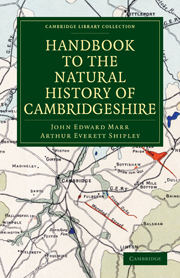Book contents
- Frontmatter
- PREFACE
- Contents
- ADDENDA AND CORRIGENDA
- PHYSIOGRAPHY
- GEOLOGY
- VERTEBRATE PALÆONTOLOGY
- ZOOLOGY
- Mammals
- Birds
- Reptiles and Amphibians
- Fishes
- Mollusca
- Insects: Introduction
- Insects: Orthoptera
- Insects: Neuroptera
- Insects: Hemiptera
- Insects: Coleoptera
- Insects: Lepidoptera
- Insects: Diptera
- Insects: Hymenoptera
- Myriapoda
- Arachnida
- Crustacea
- FLORA
- PREHISTORIC ARCHÆOLOGY
- Appendix to the Article on the Mollusca
- INDEX
- Plate section
Fishes
Published online by Cambridge University Press: 10 November 2010
- Frontmatter
- PREFACE
- Contents
- ADDENDA AND CORRIGENDA
- PHYSIOGRAPHY
- GEOLOGY
- VERTEBRATE PALÆONTOLOGY
- ZOOLOGY
- Mammals
- Birds
- Reptiles and Amphibians
- Fishes
- Mollusca
- Insects: Introduction
- Insects: Orthoptera
- Insects: Neuroptera
- Insects: Hemiptera
- Insects: Coleoptera
- Insects: Lepidoptera
- Insects: Diptera
- Insects: Hymenoptera
- Myriapoda
- Arachnida
- Crustacea
- FLORA
- PREHISTORIC ARCHÆOLOGY
- Appendix to the Article on the Mollusca
- INDEX
- Plate section
Summary
Cambridgeshire is eminently a county of anglers. This fisherman instinct comes from bygone generations, for fishing was once an industry of the county and adjoining districts. It was one of the objections raised against the first drainage of the Fens that many thousands engaged in fishing and fowlling would be thrown out of employment. As late as 1749 there was a fish market in Cambridge itself, which was supplied with fresh-water fish from the neighbouring Fens. It was held twice a week, and salmon and sturgeon could be purchased.
In early days the Cambridgeshire fisheries were numerous and important, a considerable portion of the endowments of the old monastery of Ely being derived from them. From accounts in Dugdale and Camden the amount of fish was enormous. According to Bede the very name of Ely itself is derived from the vast number of eels caught in the vicinity. The importance of these fisheries in ancient days was so great that lawsuits were waged over them. On one occasion the Abbot of St Edmondsbury successfully obtained an injunction against the diverting of the Nene requisite to protect Wisbech and the adjoining country from inundation. The Abbot pleaded that should the course of the Nene be altered, a certain fishery in that district belonging to his Abbey would be ruined. With reference to later times a quotation from an old fragmentary History of Cambridgeshire may be instructive.
- Type
- Chapter
- Information
- Handbook to the Natural History of Cambridgeshire , pp. 108 - 113Publisher: Cambridge University PressPrint publication year: 2010First published in: 1904



